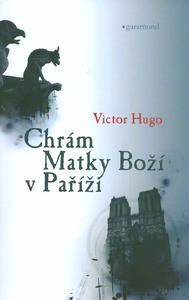Take a photo of a barcode or cover
I have definitely found my new favorite book! Unbelievable story and plot paired with the brilliant writing of Victor Hugo made this a book I will love and remember for the rest of my life.
In some ways, this reads like an odd book. If you read it for the story involving Esmeralda, the beautiful young gypsy girl, Quasimodo the hunchback bell-ringer and Frollo the archdeacon, you may be put off or annoyed by the digressions into the layout of Paris, or the architecture of Notre Dame, or a treatise on architecture in general and why newer isn't always better. For me, I found it created some odd pacing and I wondered if perhaps at one time it was more common to set a scene in such minute detail. But in reading about the book after the fact, I see that in many ways, the story about Esmeralda and company are actually the digressions from the main text, which was Hugo's views about Gothic architecture. Well, it's probably a good thing he put a story around all of that, or it probably would have been a hard sell. (His views, by the way, boil down to "Kids these days! Get off my lawn!")
So all right, back to the story that people actually want to read - the gypsy, the bell-ringer, the handsome captain, the archdeacon, and of course, the goat. While reading, I was a little surprised by how few good guys there were - it was very interesting to see that beauty didn't equate to good in Hugo's world. In fact, the moral of the story might be instead of "all that glitters is not gold," "all that glitters is not only not gold, it's got a sharp edge that was probably dipped in poison." As far as the writing goes, for a novel written in the early 1800s, the story skipped along quite quickly, and although some twists were telegraphed far ahead of time, others weren't at all. Well worth the read.
Recommended for: people who only know the Disney version of the story, those intimately familiar with Paris, people who prefer animals to humans.
Quote: "And then, from morning till night, I have the happiness of passing all my days with a man of genius, who is myself, which is very agreeable."
So all right, back to the story that people actually want to read - the gypsy, the bell-ringer, the handsome captain, the archdeacon, and of course, the goat. While reading, I was a little surprised by how few good guys there were - it was very interesting to see that beauty didn't equate to good in Hugo's world. In fact, the moral of the story might be instead of "all that glitters is not gold," "all that glitters is not only not gold, it's got a sharp edge that was probably dipped in poison." As far as the writing goes, for a novel written in the early 1800s, the story skipped along quite quickly, and although some twists were telegraphed far ahead of time, others weren't at all. Well worth the read.
Recommended for: people who only know the Disney version of the story, those intimately familiar with Paris, people who prefer animals to humans.
Quote: "And then, from morning till night, I have the happiness of passing all my days with a man of genius, who is myself, which is very agreeable."
Capolavoro! Ambientato alla fine del 400 ha la cattedrale al centro della narrazione. Hugo descrive nei minimi particolari la struttura della stessa risultando certe volte prolisso. E' un opera immortale cosi come gli intrighi e le vicende narrate dall'autore. Non mancano neanche i momenti di pura poesia che ho amato alla follia. Mi sono innamorato di Esmeralda, ho vissuto la disperazione di Quasimodo e ho pianto alla fine del romanzo (solo poche volte succede).
A great book, beautifully written with interesting characters and a great story. Some chapters are a bit unnecessary and boring, when the author takes a break from the story to just describe medieval Paris. Totally worth it though
challenging
informative
slow-paced
slow-paced
Setting. So. Much. Freaking. Setting. And these characters! I could not enjoy their story because all of it hinged on this premise of Esmerelda being so incredibly beautiful and physically lovely that everyone was following her around and falling passionately in love with her--but it all had to do with her appearance. Ninety-five percent of her dialogue was her saying, "Oh, Phoebus...my Phoebus." My goodness, she was annoying. Claude Frollo didn't even know her and was just crazy, and Phoebus was a careless pig. For about ten seconds, Esmerelda was kind to Quasimodo, but even that wasn't enough to justify him falling in love with her.
I really wanted to like this story and there were a few times when I found myself amused by a quick line or detail Hugo threw in, but I was so over this story by the middle of book seven (there are ten books, in all). The best part was when the one dude ran away with the goat and abandoned Esmerelda, leaving her with creepy Frollo. That was satisfying, and, if I had been in the story, I would have made the same move.
I really wanted to like this story and there were a few times when I found myself amused by a quick line or detail Hugo threw in, but I was so over this story by the middle of book seven (there are ten books, in all). The best part was when the one dude ran away with the goat and abandoned Esmerelda, leaving her with creepy Frollo. That was satisfying, and, if I had been in the story, I would have made the same move.
dark
emotional
mysterious
sad
tense
slow-paced
Plot or Character Driven:
Plot
Strong character development:
No
Loveable characters:
Complicated
Diverse cast of characters:
No
Flaws of characters a main focus:
Complicated
Graphic: Ableism
Moderate: Animal cruelty, Animal death, Sexual violence
In a typical Hugo fashion, there were intervening chapters with naught to do with the story. I don't know if I'm exaggerating since I've really only read this and [b:Les Miserables|6648041|Les Miserables (Classics Illustrated)|Classics Illustrated|https://images.gr-assets.com/books/1462334629s/6648041.jpg|44515804] but it feels like it's his style along with overly romanticising everybody and add to that, the swooning fall-in-love trope. Not that I mind the last bit very much except that the lady is lacking in character somewhat. Dear Esmeralda...
She fainted here!
She fainted there!
She fainted everywhere!

I expected an intelligent gypsy girl to have more Gumption!
On the other hand, I actually felt sorry for the villain, Claude Frollo, **evil laughs**
I feel his lack of nurture and therefore, inability / incapability to deal with emotions which no one had ever previously stirred in his heart. He was a nut-job obviously but as all of us are defined by the world around us, so was he.
And for the Disney movie lovers... pssst, do NOT ever read this book with the most tragic ending Ever! You have Disney to thank for that ;p
She fainted here!
She fainted there!
She fainted everywhere!

I expected an intelligent gypsy girl to have more Gumption!
On the other hand, I actually felt sorry for the villain, Claude Frollo, **evil laughs**
I feel his lack of nurture and therefore, inability / incapability to deal with emotions which no one had ever previously stirred in his heart. He was a nut-job obviously but as all of us are defined by the world around us, so was he.
And for the Disney movie lovers... pssst, do NOT ever read this book with the most tragic ending Ever! You have Disney to thank for that ;p
I didn't think I liked this book very much until the end, when I realized I actually liked it quite a bit. I didn't know Hugo had this much capacity for tragedy in him. It reminded me a lot of Dickens, but without the happy ending. Sorry if that's a spoiler, but I think classics are fair game.







